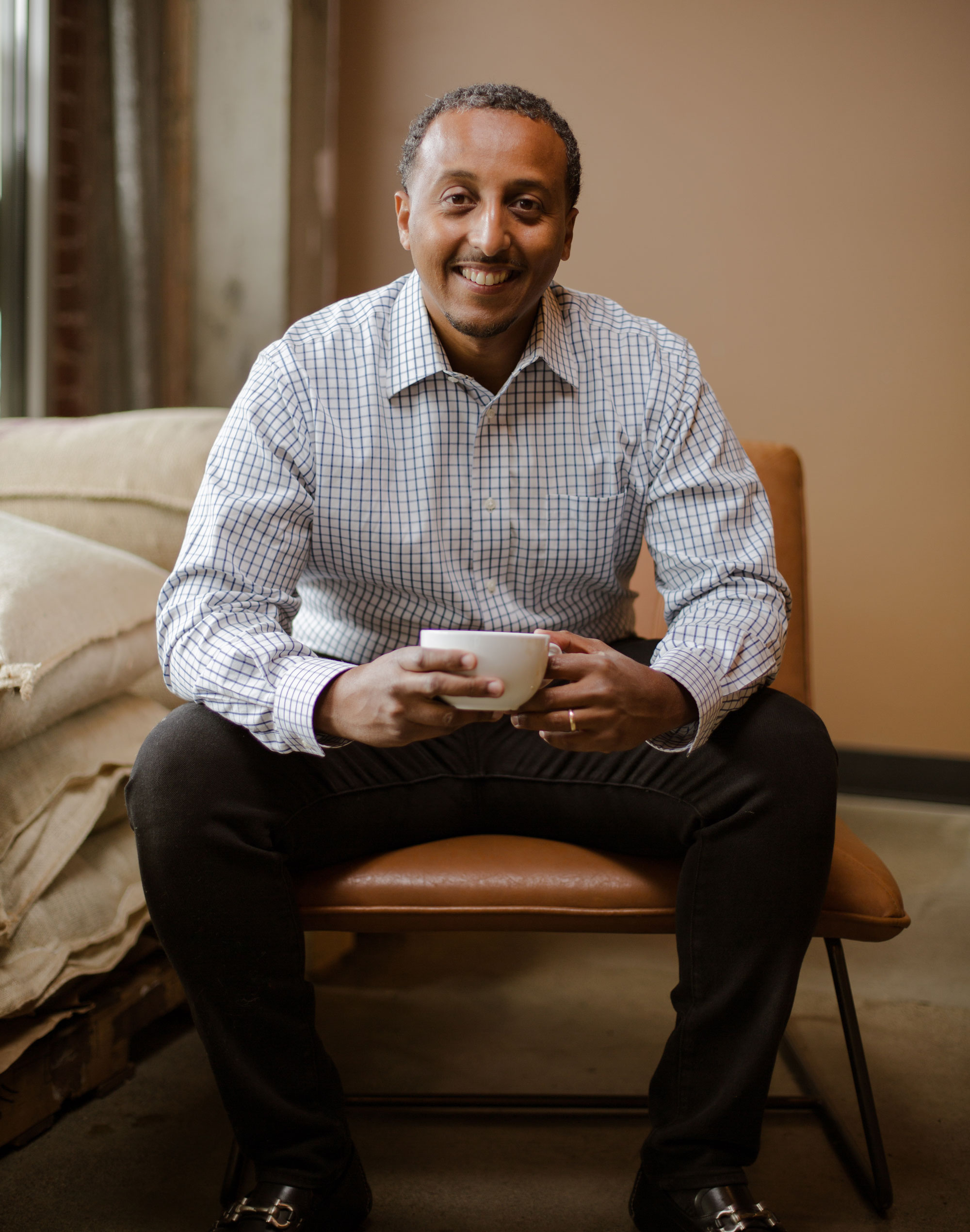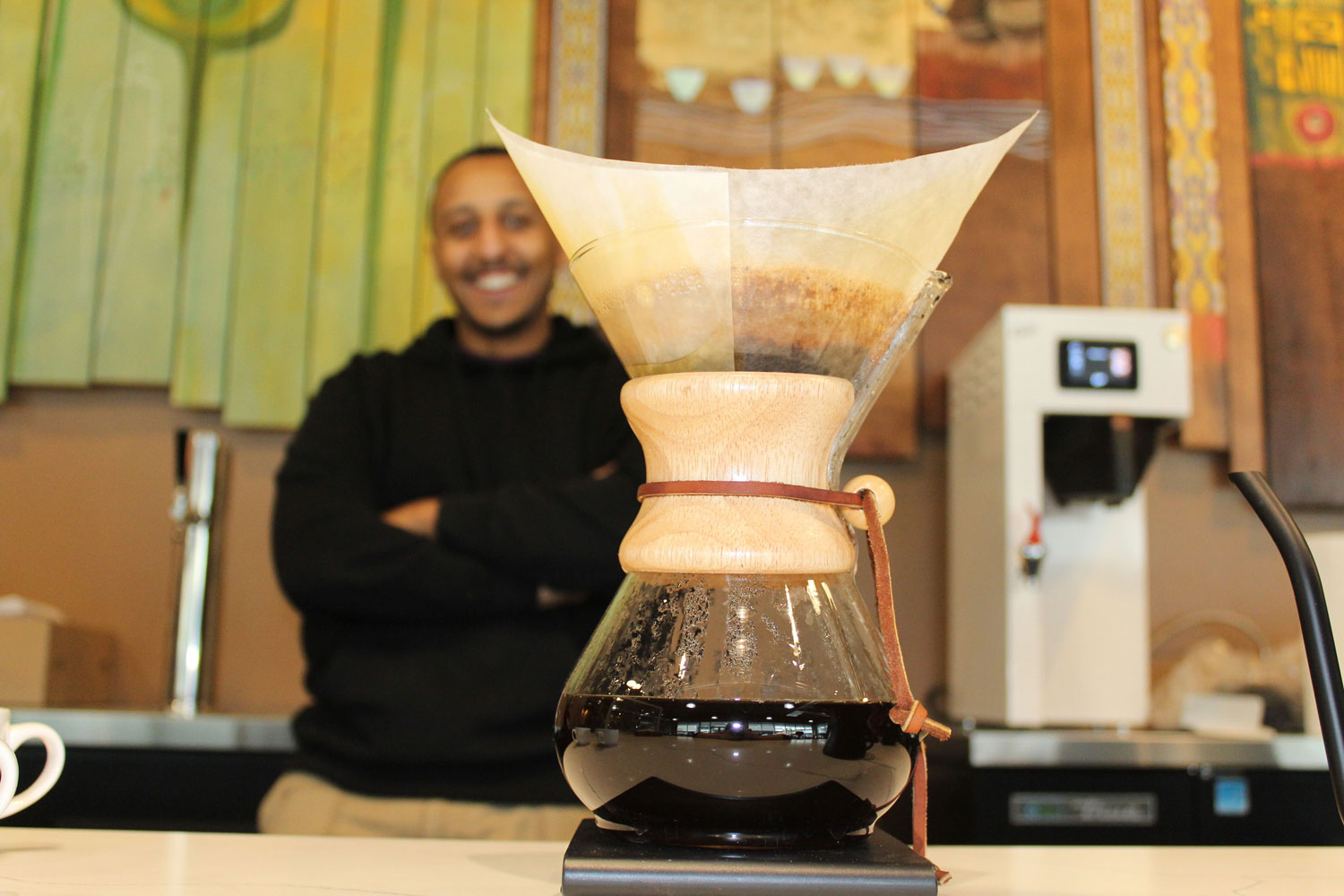
Coffee and community Coffee and community Coffee and community
Efrem Fesaha showcases African coffee history through Boon Boona.
By Aleenah Ansari | Photos by Jeriel Calamayan | April 12, 2024
It’s a winter day in 2019, and Efrem Fesaha is seeing a physical realization of a 8-year-long dream: The opening of the first Boon Boona Coffee location in Renton.
Fesaha was nervous, but excited. He had been working his full-time job, taking courses through the Foster School of Business Ascend program that supports diverse business owners and working on an MBA to prepare for this moment.
“Was I completely ready? No,” Fesaha said with a smile. “We forgot to get change for the register on the first day, and we didn’t have a bussing bin. I’m just glad someone captured the moment when I opened the doors.”
Since then, Fesaha has opened additional locations in Capitol Hill and University District, not to mention Fred Hutchinson Cancer Center and Microsoft. We sat down to talk about the journey to start Boon Boona Coffee, how he draws on his community and the history of coffee in Africa and the experiences that prepared him to be a small business owner.
When you think back to the beginning of Boon Boona’s journey, what was your dream for the business?
I had taken a trip to Eritrea to learn more about how they traditionally prepare coffee using methods that are a thousand years old, and to get in touch with my roots by spending time in the village where my grandparents are from. I was also fortunate that my parents taught me how to speak Tigrinya and understand Amharic, which enabled me to communicate with my grandparents.
Eritrea was colonized by Italy so there are a lot of coffee shops there, but nothing like what I saw growing up in Seattle. I wanted to bring these two places together. My dream was to create a community-centric coffee shop that could create jobs, source from African farms and be a socially conscious, for-profit business.
What is it like to run a coffee business in Seattle?
There’s a saying that if you can make it in New York, you can make it anywhere. I feel the same way about making it with coffee in Seattle. Coffee is a big part of the culture; I’m glad that I get to do it in a way that showcases the history of Africa and the traditional ways of brewing coffee while still offering a contemporary coffee experience.
You can still get a pastry and espresso or mocha, but you can also get a deeper, richer experience with coffee and conversation. It’s a little traditional, and a little contemporary.

Efrem Fesaha stands near a Chemex coffee maker, a thoughtfully designed vessel for pour-over coffee.
Your business has grown a lot since its inception, expanding with wholesale opportunities and opening new locations. What has that been like for you?
I’m grateful that people love our coffee and products, and that the community has advocated for us to be in places like Microsoft, Fred Hutch and the University Bookstore. To this day, I get excited when people say they’ve been to my cafe, or I see someone holding a cup with our design.
How has support from the community fueled your business?
Giving back to the community is at the heart of what we do. We’ve been able to work with three different woman-owned and -operated farms in Burundi. Locally, we partner with local organizations inside and outside the coffee scene, whether it’s through local artists selling their art in our space, poetry nights and open mics, or pop-ups to support small businesses.
What moments and experiences prepared you to run Boon Boona Coffee?
In the early days, I would go door to door to sell coffee out of my car, whether I was in Seattle, L.A., and San Francisco. I had a background in finance and accounting, which prepared me to create a business and financial plan, but I was still getting a lot of no’s from pitches to get funding. I had to remember to give myself grace because I was still working on my craft, but I strongly believed in my product and vision.
Each experience taught me something new, whether it was how to hire well or build strong partnerships. I sought out mentorship from Dr. William Bradford, the dean emeritus and professor of finance, whom I met through the Ascend program. Five years ago, I asked Dr. Bradford if he had time to look over my finance books in exchange for coffee. We sat down and reviewed my numbers, and he continues to be a mentor to this day. Now, I meet with students and other small business owners to learn about their businesses or share resources.
Why is it important to you to continue to mentor the next generation of BIPOC entrepreneurs?
It’s a responsibility of mine to share, encourage and motivate budding entrepreneurs because I know how much it meant to me. We’ll use those conversations to problem solve, and I’ll ask more about what they’re passionate about.
I also tell entrepreneurs that you can also get a lot of feedback from your own community. If you want to open up a bakery, bake at home and give it to friends and listen to their feedback. Take feedback in stride.
What matters most is being dedicated to your craft, and celebrating the things you accomplish along the way. Piece by piece, your dream will come to life.
Check out Boon Boona Coffee in the University Bookstore, Renton and Capitol Hill.
About the author: Aleenah Ansari (she/her) is equal parts storyteller, creative problem solver, and journalist at heart who’s rooted in the stories of people behind products, companies, and initiatives. She writes about travel, entrepreneurship, mental health and wellness, and representation in media for Insider, The Seattle Times, Byrdie, and more. You can usually find her searching for murals, reading a book by a BIPOC author, or planning her next trip to New York. You can learn more at www.aleenahansari.com.